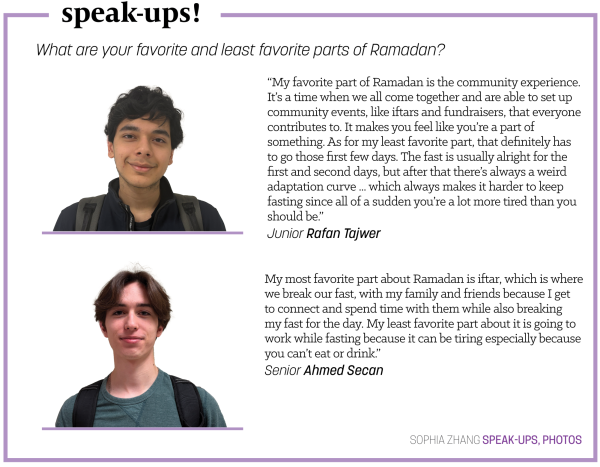Every year, Muslims fast from sunrise to sunset for 30 days. This month, known as Ramadan, is a very holy month for all Muslims. Fasting during this time is one of the five main pillars of the faith. At the end of the month, a celebration known as Eid-ul-Fitr occurs. As a Muslim myself, I have fasted every year since I was 8 years old. During this month, there are a lot of benefits as well. For example, one of the major purposes of Ramadan is to renew your faith. It allows me to reconnect with Allah, the Arabic word for God, and develop a closer relationship with Him. Ramadan also has a variety of different health benefits, and can be incredibly beneficial for your body. There are a couple struggles that come with fasting during the school day.
The biggest struggle I have encountered is fatigue. Since you usually won’t have eaten for many hours, a wave of fatigue hits. It can be incredibly difficult to focus on school work. The majority of the time, I may have to re-teach myself something the teacher has already talked about in class because I was just exhausted during that class period. Fatigue can also affect the social aspect of school. A lot of times I catch myself zoning out of conversations because of fatigue.

Another struggle I have faced is teachers not being understanding of students who are fasting. Obviously, teachers cannot give any sort of extreme special treatment to these students, however, it’s important to foster a little bit of understanding. For example, if a Muslim student puts their head down in class for a few minutes, that shouldn’t be something they get yelled at for immediately. Students also should be given some leniency with missing tests, especially on Eid. Eid is the celebration that occurs at the end of Ramadan. I have had teachers who were unwilling to allow the student to make up a certain assignment, project or test if they miss that date. This is a struggle students of other faiths might not face as often. This is because Eid is not on a set day, it moves back. Every year, Eid and the start of Ramadan moves back ten days. This is because our calendar is lunar-based, rather than a traditional solar based calendar. I understand teachers aren’t mind readers and they might not know if a student is fasting or not. This responsibility lies on the student, to communicate this information to their teachers in a respectful manner. At the end of the day, teachers should be more lenient with students who are fasting, and students need to make their teachers aware of what they are participating in.
The views in this column do not necessarily reflect the views of the HiLite staff. Reach Ayaan Nadeem at anadeem@hilite.org.

































![AI in films like "The Brutalist" is convenient, but shouldn’t take priority [opinion]](https://hilite.org/wp-content/uploads/2025/02/catherine-cover-1200x471.jpg)










































![Review: “The Immortal Soul Salvage Yard:” A criminally underrated poetry collection [MUSE]](https://hilite.org/wp-content/uploads/2025/03/71cju6TvqmL._AC_UF10001000_QL80_.jpg)
![Review: "Dog Man" is Unapologetically Chaotic [MUSE]](https://hilite.org/wp-content/uploads/2025/03/dogman-1200x700.jpg)
![Review: "Ne Zha 2": The WeChat family reunion I didn’t know I needed [MUSE]](https://hilite.org/wp-content/uploads/2025/03/unnamed-4.png)
![Review in Print: Maripaz Villar brings a delightfully unique style to the world of WEBTOON [MUSE]](https://hilite.org/wp-content/uploads/2023/12/maripazcover-1200x960.jpg)
![Review: “The Sword of Kaigen” is a masterpiece [MUSE]](https://hilite.org/wp-content/uploads/2023/11/Screenshot-2023-11-26-201051.png)
![Review: Gateron Oil Kings, great linear switches, okay price [MUSE]](https://hilite.org/wp-content/uploads/2023/11/Screenshot-2023-11-26-200553.png)
![Review: “A Haunting in Venice” is a significant improvement from other Agatha Christie adaptations [MUSE]](https://hilite.org/wp-content/uploads/2023/11/e7ee2938a6d422669771bce6d8088521.jpg)
![Review: A Thanksgiving story from elementary school, still just as interesting [MUSE]](https://hilite.org/wp-content/uploads/2023/11/Screenshot-2023-11-26-195514-987x1200.png)
![Review: "When I Fly Towards You", cute, uplifting youth drama [MUSE]](https://hilite.org/wp-content/uploads/2023/09/When-I-Fly-Towards-You-Chinese-drama.png)
![Postcards from Muse: Hawaii Travel Diary [MUSE]](https://hilite.org/wp-content/uploads/2023/09/My-project-1-1200x1200.jpg)
![Review: "Ladybug & Cat Noir: The Movie," departure from original show [MUSE]](https://hilite.org/wp-content/uploads/2023/09/Ladybug__Cat_Noir_-_The_Movie_poster.jpg)
![Review in Print: "Hidden Love" is the cute, uplifting drama everyone needs [MUSE]](https://hilite.org/wp-content/uploads/2023/09/hiddenlovecover-e1693597208225-1030x1200.png)
![Review in Print: "Heartstopper" is the heartwarming queer romance we all need [MUSE]](https://hilite.org/wp-content/uploads/2023/08/museheartstoppercover-1200x654.png)



